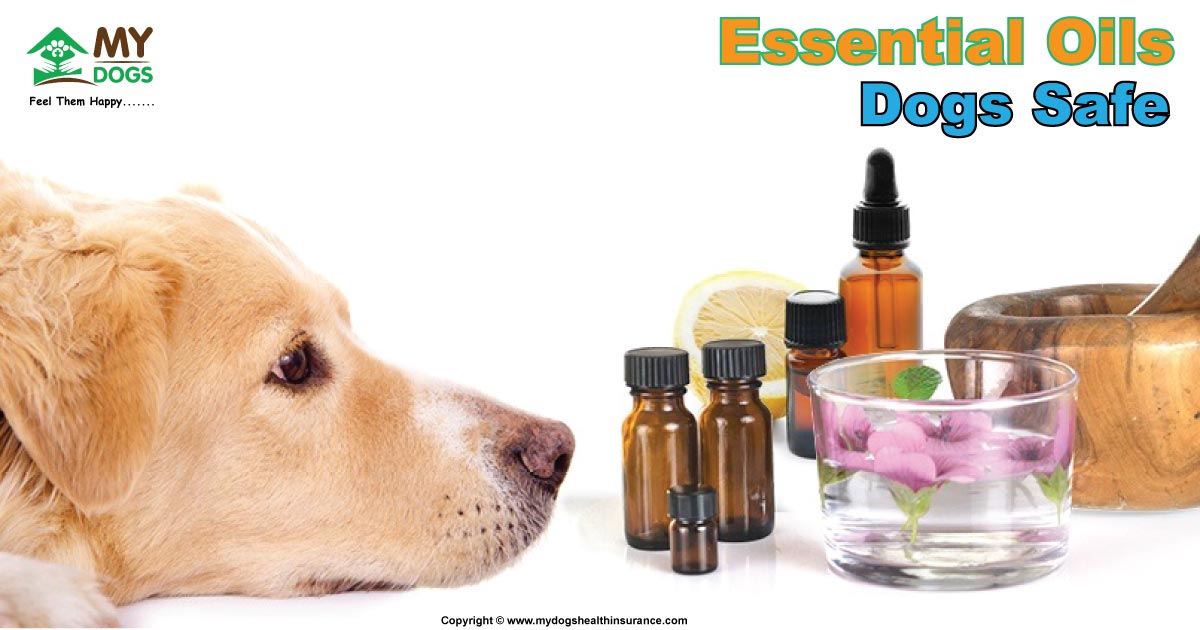Fresh herbs have been used for centuries to promote health and well-being in both humans and animals. Dogs, in particular, can benefit greatly from the use of fresh herbs for dogs in their diets. Not only do herbs provide essential vitamins and minerals, but they also contain natural compounds that can help improve digestion, boost immunity, and reduce inflammation.
Herbs can be picked fresh and used raw as a supplement in food, e.g., dandelion leaves or parsley. The volume of herb needed to achieve an effective medicinal dose is usually prohibitively high, so using fresh herbs is usually reserved for daily supplementation in a preventive or overall health sense. There are many herbs for dogs that taste good and will be accepted when chopped into a dog’s food, but there are as many herbs that don’t taste so great, especially the bitter herbs that are often highly beneficial for digestion and liver health. You may need to add other more strong-tasting foods to disguise the taste. Often dried powdered herbs can be tucked into foods without too many problems.
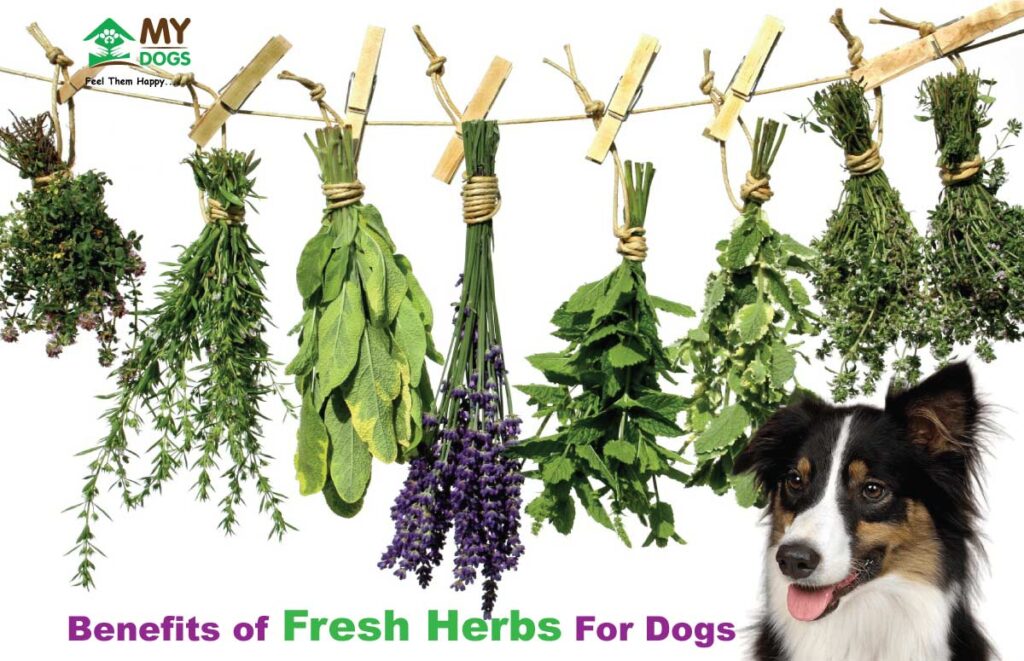
Benefits of Fresh Herbs For Dogs:
Fresh herbs can provide several benefits to dogs, including:
- Natural source of vitamins and minerals: Fresh herbs for dogs are a great source of vitamins and minerals, which can help support your dog’s overall health and well-being.
- Anti-inflammatory properties: Many fresh herbs have anti-inflammatory properties that can help reduce inflammation and pain in dogs. This can be particularly helpful for dogs with arthritis or other inflammatory conditions.
- Improved digestion: Fresh herbs can also help improve digestion in dogs by promoting the production of digestive enzymes and aiding in the absorption of nutrients.
- Natural pest repellent: Some fresh herbs, such as rosemary, lavender, and peppermint, have natural pest-repellent properties that can help keep fleas, ticks, and other insects at bay.
- Fresh breath: Certain fresh herbs, like parsley and mint, can help freshen your dog’s breath naturally, which can be especially helpful for dogs with bad breath.
- Stress and anxiety relief: Some fresh herbs, like chamomile and valerian, have calming properties that can help reduce stress and anxiety in dogs.
It’s important to note that while fresh herbs can provide many benefits for dogs, they should be used in moderation and under the guidance of a veterinarian or animal nutritionist. Some herbs can be toxic to dogs in large quantities, so it’s important to know which ones are safe and appropriate for your pet.
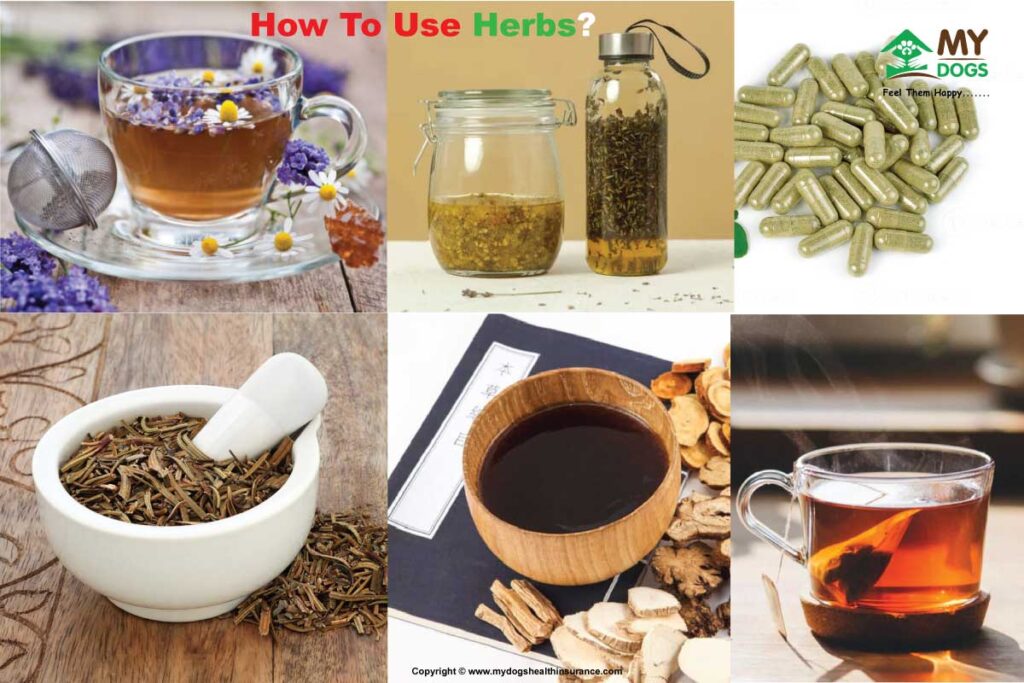
How To Use Herbs:
Another way to use fresh herbs for your dog is to make herbal infusions. This involves steeping fresh herbs in hot water and then allowing the mixture to cool before serving it to your dog. Herbal infusions can be used to help calm anxiety, soothe upset stomachs, and promote healthy skin and coat.

Herbs Teas:
Often the doses are not high enough to act in a medicinal way, but teas are an easy way to prepare herbs for low-level and long-term effects. They can be broadly divided into infusions and decoctions.
Read a more detailed article: Best Herbs Teas for Dogs.
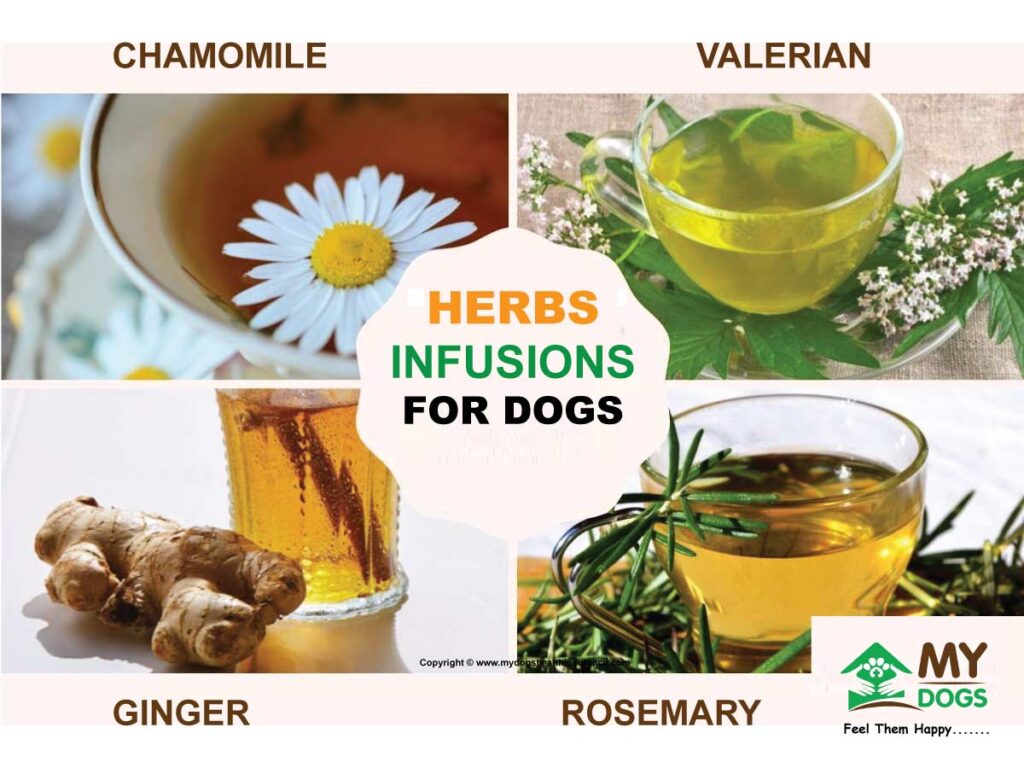
Herbs Infusions:
Use the leaves, young stems, and flower petals, either finely chopped or powdered and dried. Pour boiling water over them and let them stand for about ten minutes. Use about two teaspoons of dried herbs in a cup of water. Can be kept for up to 48 hours in a cool environment.
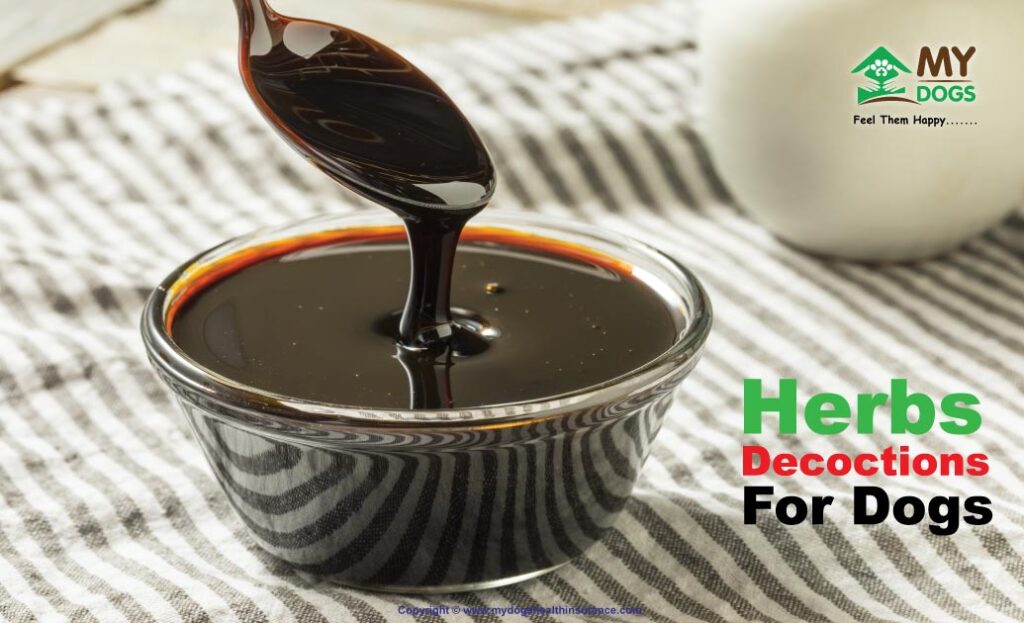
Herbs Decoctions:
Use woody stems, barks, berries, and roots. Can use cold or hot water, but it takes longer to prepare than an infusion. Put sliced or chopped herbs in a saucepan, pour over cold water, and bring to a boil, then simmer slowly for 20 to 40 minutes. Reduce the volume by one-third to a half. Remove from the heat, strain, and store in a cool place for up to 48 hours.
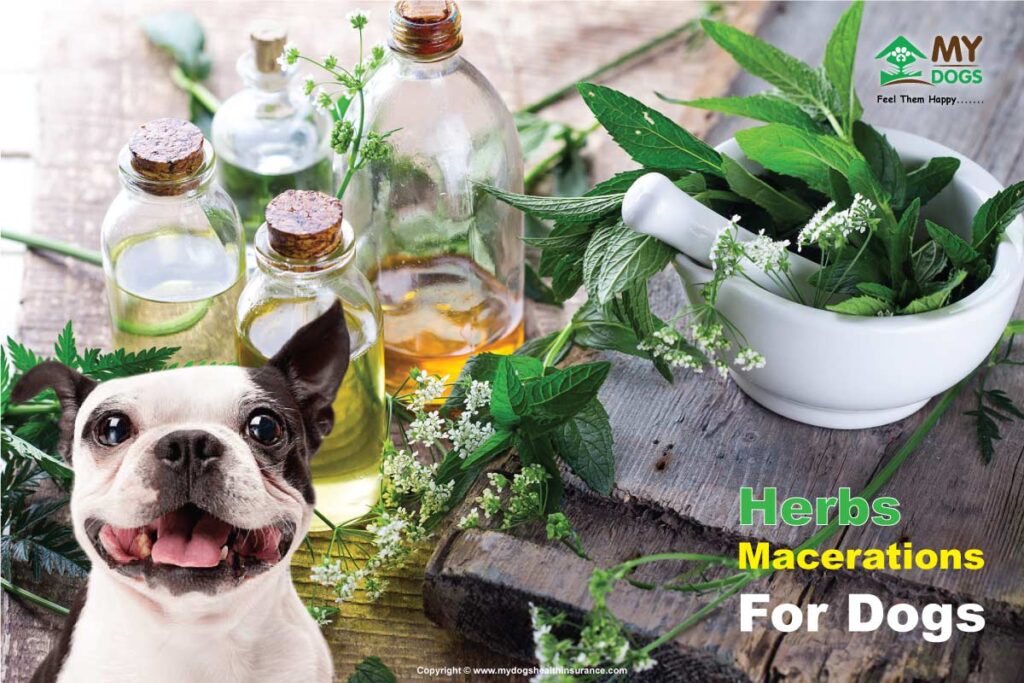
Herbs Macerations:
These are cold infusions or decoctions used when the active ingredient is sensitive to heat (e.g., valerian, parsley). Use cold water and the herb (chopped or sliced) in a 6:1 ratio. Leave to stand in a cool place for approximately 12 hours, then strain. The duration is up to 48 hours.
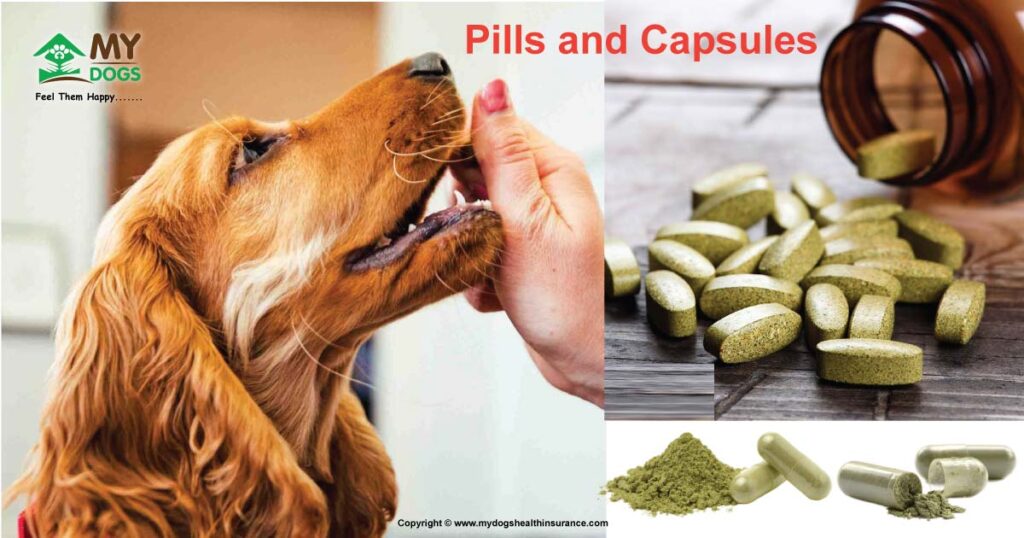
Pills and Capsules:
This is probably the easiest way to get herbs into animals. The taste is not as strong as with alcohol-based tinctures, and it also concentrates the herbs so less volume is needed.
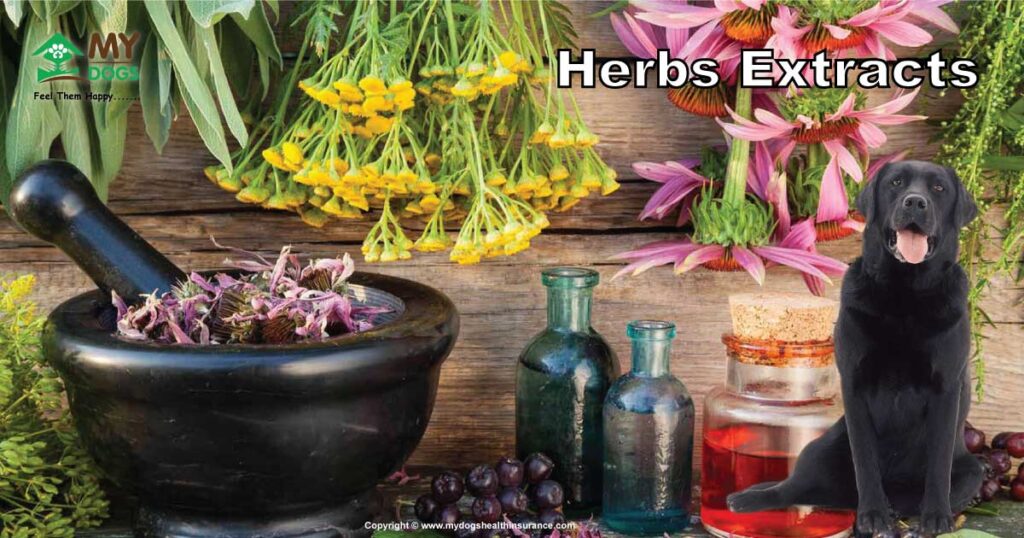
Herbs Extracts:
Herbs can be made up in alcohol (as a tincture), water or glycerine. The benefit of this is that dosages can be more exact, so the results are more consistent. The downside is that they can taste quite strong, so getting them into animals’ mouths can be a challenge. Tinctures can be heated to remove the alcohol first, which reduces the taste slightly.
Herbs Dosages:
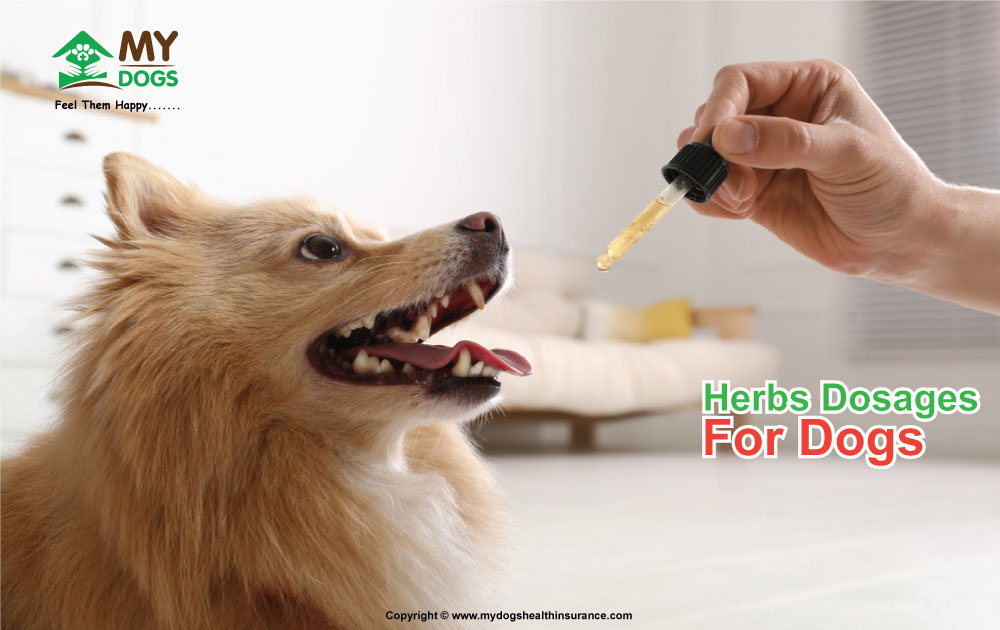
Unfortunately, there is no standard, well-researched veterinary Dosing values available for herbs so giving doses can be a bit hit and miss since veterinarians tend to use human dosages and Extrapolate them for their animal patients. It is normal to start With a lowish amount for a particular animal’s weight and size.
Herb Doses For Cats and Dogs:
| Preparation | Cats (10 lbs.) | Dogs (25 lbs.) |
| Decoction | 5ml 2 x daily | 10ml 3 x daily |
| Extract powder capsule (100 mg) | 125mg 2 x daily | 250mg 2-3 x daily |
| Extract tablet (250 mg) | 125mg 2 x daily | 250mg 2-3 x daily |
| Freeze-dried granules (100 mg capsules) | 100mg 2 x daily | 200mg 3 x daily |
| Loose granules | 0.25 tsp 2 x daily | 0.5 tsp 3 x daily |
| Syrups (crush extract tablet or use Granules mixed with hot honey) | 0.25 tsp 2 x daily | 0.5 tsp 3 x daily |
| Tinctures (remove alcohol by heating First) | 5 Drops 3 x Daily | 5 drops 3 x daily 10 drops 3 x daily |
| Chinese patent medicines (pills) | 10% of human Dose | 25% of human Dose |
Note:
These doses will vary with the kind of herb and problem. Stronger herbs are Given for shorter periods (3-7 days); milder herbs for 10-14 days; supplemental herbs For 1-3 months (or maybe for the lifetime, i.e., for cancer).

Some Herbs Avoid to Use for Dogs:
Some herbs should be avoided when it comes to dogs, however. Garlic and onions, for example, can be toxic to dogs in large amounts. Other herbs, such as rosemary and sage, should be used in moderation as they can cause digestive upset in some dogs.
If you’re unsure about which herbs are safe for your dog, it’s always best to consult with your veterinarian before adding them to your dog’s diet. Additionally, if you plan on using herbs for medicinal purposes, it’s important to discuss this with your vet as well, as some herbs can interact with certain medications.

Conclusion:
In conclusion of herbs for dogs, to improve their health and well-being. Many dog owners are turning to herbal supplements as a natural alternative to conventional medicines, which may come with unwanted side effects. Herbal remedies for dogs can range from simple herbs like chamomile and ginger to more complex formulas that combine multiple herbs to address specific health concerns. However, it’s important to note that not all herbs are safe for dogs, and some may even be toxic. Thus, it is crucial for pet owners to research and consult with a veterinarian before giving any herbal supplements to their dogs.
Note: For more informative Articles about dog Food & Nutrition, Click Here:
FAQ
What herbs are not good for dogs?
There are several herbs that can be harmful to dogs and it can damage the dog’s nervous system, including garlic, onion, chives, pennyroyal, yew, black papers Cocoa Powder, and comfrey, among others. It is important to consult with a veterinarian before giving any herbs or supplements to your dog, as some can cause serious health problems or even be toxic.
Can you add herbs to dog food?
Yes, you can add herbs to dog food as long as they are safe for dogs and given in appropriate amounts. Some herbs such as parsley, basil, and oregano can be beneficial for dogs and can help improve their overall health. However, it’s important to consult with a veterinarian before adding any herbs or supplements to your dog’s diet to ensure they are safe and appropriate for your dog’s individual needs.
What plants should dogs avoid?
There are several plants that dogs should avoid, including toxic plants such as lilies, azaleas, rhododendrons, daffodils, tulips, and oleander. Other common plants such as ivy, aloe vera, and ferns can also be harmful to dogs. It’s important to keep these plants out of your dog’s reach and to consult with a veterinarian if you suspect your dog has ingested any toxic plant material.
Some Other Poisonous Plants for Dogs are below:
- Both berries (Hedera helix) and leaves of English Ivy.
- Thorn apple or jimsonweed (Datura stramonium)
- Cyclamen (Cyclamen spp.)
- (Ricinus Communis) – Castor bean Or Castor oil plant.
- Dumbcane (Dieffenbachia)
- Oleander (Nerium oleander)
- Hemlock (Conium maculatum)
- Mistletoe (Viscum album)


